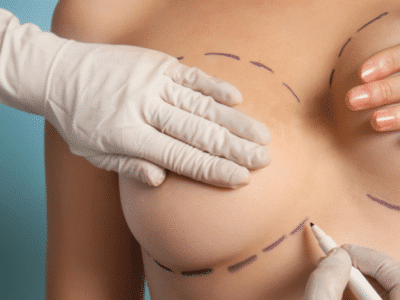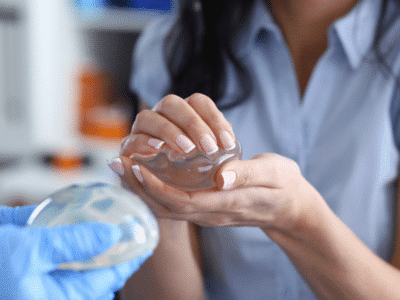Table of Contents

If you have been thinking about having breast implants, the chances are you will already have learnt a great deal about the different types of breast implants, breast implant incisions and choosing the best size of the implant. We believe one of the most critical areas to bear in mind is ensuring the highest standards of breast implant safety. The vast majority of women who have this procedure are delighted with their breast implant results and have never encountered any issues during or after the procedure. Having said that, there are several potential breast implant risks to be aware of. Here at Centre for Surgery, we take patient safety very seriously and have emphasised the most important safety considerations concerning breast augmentation below. If you want to learn more about optimising safety in breast augmentation, please discuss this further with the surgeon at your consultation.
RELATED: What are the risks of breast augmentation?
Why is it important to consider the safety of breast implants?
Deciding to undertake any form of surgery, including breast implant surgery, should not be undertaken lightly. Although breast augmentation is a straightforward procedure to carry out, there are several important factors to consider about the nature of breast implants themselves:
- Breast implants are not designed to last for the lifetime of an individual. Approximately 10 to 15 years after your first procedure, we recommend having a consultation with your surgeon to discuss breast implant removal or breast implant replacement. If you choose to have your implants removed, you may need to have a breast lift at the same time to correct saggy breasts that have developed over time.
- Breast implant rupture is rare with the latest generation implants but is still a potential risk with any implant. Although implant rupture is not a dangerous condition, it is essential to have corrective breast surgery to remove and/or replace the implant.
- Silicone breast implants require regular surveillance, and we would recommend undertaking high-resolution ultrasound scanning every two years. Centre for Surgery is one of the few clinics in London to offer this service to our patients.
- Breast cancer screening using mammography can sometimes be more challenging to interpret in the presence of breast implants. The doctor may need to carry out a different type of diagnostic imaging to view the breasts from different angles. These images could be more challenging to interpret. With improvements in x-ray technology, the risk of missing breast cancer in the presence of implants has markedly reduced over time.
RELATED: Common Questions about Breast Implants
Capsular contracture
Capsular contracture is used to describe excessively tight scar tissue that develops around the breast implant, which often results in pain and discomfort. Severe grades of capsular contracture can deform the underlying breast, resulting in an abnormal breast shape. This is one of the most common risks associated with breast implants. Although capsular contracture is not a dangerous condition, it is a recognised complication of breast implant surgery and will require corrective breast surgery.
The reasons why capsular contracture develops are still uncertain. However, it is thought several factors act in combination to increase the chances of the condition developing. Some studies have suggested it may be more commonly seen after revision breast surgery. Other studies demonstrate a link between patients who have had subglandular breast augmentation and the later development of capsular contracture.
Breast implant rupture
It is important to remember that breast implants are not designed to last for the lifetime of an individual patient. Breast implants have a finite lifespan with a small risk of implant rupture with the increasing age of the implant. Although breast implant rupture sounds dramatic, it is not a dangerous condition with no impact on health. Silicone breast implants have a highly cohesive gel; when implant rupture occurs, the gel remains inside the implant. Older types of silicone implants may be more prone to leakage, although any leakage is usually contained within the capsule or the pocket where the implant is placed. Silicone itself is chemically inert and is not known to result in adverse reactions if it comes into contact with body tissues. Saline breast implants are rarely used in the UK. When saline implants rupture, the body will safely reabsorb the internal say line with no adverse consequences. With any type of implant rupture, revision breast surgery will be required to remove the old damaged implant and replace it with a brand-new implant. Breast implants generally last between 10 and 15 years, with some potentially lasting for a lifetime.
BIA-ALCL
BIA-ALCL is an extremely rare risk associated with breast implants. It is a form of non-Hodgkins lymphoma that most commonly develops in the scar tissue and fluid surrounding the implant. BIA-ALCL is most commonly linked with textured breast implants. The cause of the condition is still unknown, although many surgeons believe the surface texture can significantly increase the risk of developing BIA-ALCL.
Here at Centre for Surgery, we do not use highly textured breast implants. We only use FDA-approved Mentor implants and Motiva implants, both of which have an excellent safety track record.
Corrective breast surgery
Breast implants will eventually need to be either removed or replaced with new ones. Revision breast surgery is commonly carried out at our Baker Street clinic in central London. Revision surgery is generally a very safe procedure, although, as with any surgery, there are always risks involved. The risk of complications developing is minimised as long as you are healthy without any significant chronic medical conditions such as diabetes, heart disease, high blood pressure or obesity.
RELATED: What are common breast implant problems?
Revision breast surgery may be associated with a slightly higher risk of capsular contracture. It is, therefore, vital to follow all your surgeon’s post-operative instructions in full to minimise the risk of this occurring. This includes avoiding alcohol and certain medications, which may increase the risk of bleeding. Breast massage should also be avoided, as should any activities that could increase the risk of excessive scars or bleeding, such as strenuous exercise within the first six weeks of surgery.
Breast implant illness, or BII, is another potential complication of breast augmentation. Plastic surgeons don’t generally view BII as a recognised disease. However, there have been anecdotal reports of women claiming they developed autoimmune conditions after breast implant surgery, which subsided when the breast implants were removed. It is important to tell your surgeon if you have a personal or family history of autoimmune conditions or allergies. This information will be used to determine your suitability for breast implant surgery.
Book your London breast implant surgery today
Once you have decided to proceed with breast implants, the next step is to contact us and book a consultation with an expert breast surgeon. Our state-of-the-art Baker Street clinic in central London is home to some of the top UK plastic surgeons with expertise in all types of breast surgery, including corrective breast surgery.









